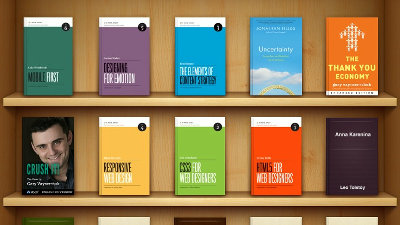It is pointed out that humans are better at recommending books than algorithms

The 'recommendations for you' displayed on streaming services and online shopping sites are based on an algorithmic analysis of past searches and access trends, and are used to display different recommendations for each user. Book review sites and e-book stores also use similar algorithms to make recommendations, but essayist Maris Kreitzman says that 'when it comes to recommending books to people, humans are better than algorithms,' and explains why.
For Book Recommendations, People Are Always Better Than Algorithms ‹ Literary Hub

When you access a specific work page on e-book stores such as Amazon or book review sites such as Goodreads, recommendations for that user may be displayed in addition to the work itself. For example, when you access the comic ' Master, I Smell Like Garlic! ' on Amazon, which is a story about a vampire tasting garlic gourmet, you will be recommended works related to 'Vampire Garlic Gourmet' such as 'I Just Want to Bully You, Asahi-san ,' a comic also published by GIGAZINE, as 'Purchasers who read this book also read this.'

While it's convenient to have an algorithm recommend books that are suitable for you from a huge number of genres and content, essayist and long-time semi-professional book recommender Kreitzman points out that when it comes to book recommendations, humans are 'always better' than algorithms.
Kreitzman explains why it is difficult for algorithms to recommend books: 'What we want in a book are attributes that the book has that cannot be quantified.' Algorithms can recommend books that have similar elements to books that a particular user likes, including the book's genre, field of expertise, story plot, and metadata. However, the feeling of 'I like/don't like this book' when actually reading a book is often based on things that cannot be quantified, such as the style of writing, word choice, rhythm, philosophical views, and the warmth of joy or sadness.

Drawing on his years of experience, Kreitzman gives examples of common requests for book recommendations and how he would respond.
For example, if you tell them you want a 'smart novel that's engrossing, but not wasteful,' they'll recommend something like 'a literary novel with a powerfully constructed plot, full of energy, and perfectly structured.' The sense of 'engrossing, exciting' and 'smart, without wasteful structure' is difficult to discern from genre and metadata, and algorithms are not good at it.
Similarly, it is difficult for algorithms to quantitatively judge feelings such as 'fun' or 'sad.' No matter how fun a book is, there are always some bad things that happen in the ups and downs of the story, and no matter how sad a book is, there are always some moments of fun. Therefore, the 'tone' of a book is important in determining whether it is a 'fun book' or a 'sad book' throughout its entirety. Since tone is rarely included as metadata, it is difficult for algorithms to recommend a book for fun reasons, but since tone is conveyed to most people who read it, it can be said that it is an easy criterion for recommending a book as 'I recommend this book because it is fun.'

Additionally, human recommenders often provide guidance, such as 'If you like this author's books, we recommend this author's next book.' Whether it's novels, non-fiction, or specialized books, the tone, difficulty, and sense of humor of the writing are consistent to a certain extent for each author, so it's possible to follow a path such as 'If you like this author, try this one next,' or 'If you don't like this author, this one might be easier to read.' The goal is similar to an algorithm that says 'Purchasers who read this book also read this,' but human recommenders can make recommendations that are more closely aligned with your preferred type and tone.
Kreitzman is often asked for book recommendations over the internet, and as a semi-professional, he analyzes the content of those consultations and then comes up with recommendations, but it's not always necessary to rely on professionals for recommendations. It's also effective to ask for recommendations from acquaintances who have read the same work as you, or from book review blogs, and on the short video sharing social networking site TikTok, a genre of videos introducing recommended books has become popular, and there have been confirmed cases of bestsellers being born from 'BookTok.'
'Book introduction videos' posted on TikTok are creating new bestsellers - GIGAZINE

Kreitzman says that when recommending books, it's important to break down the person's needs and point out things that go beyond quantifiable algorithmic settings and metadata.
◆ Forum is currently open
A forum related to this article has been set up on the official GIGAZINE Discord server . Anyone can post freely, so please feel free to comment! If you do not have a Discord account, please refer to the account creation procedure explanation article to create an account!
• Discord | 'How do you find novels and manga that you like?' | GIGAZINE
https://discord.com/channels/1037961069903216680/1227181093359194162
Related Posts:
in Note, Posted by log1e_dh






